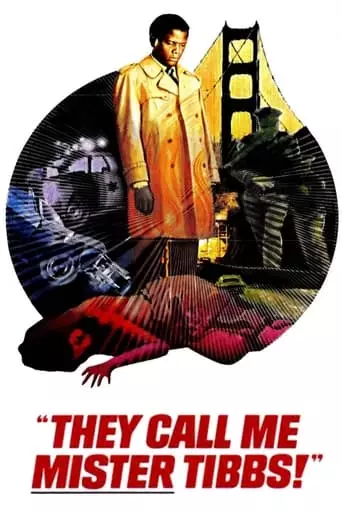
They Call Me Mister Tibbs! (1970) Watch Online Free
A police detective’s investigation of a prostitute’s murder points to his best friend.
They Call Me Mister Tibbs! is a 1970 crime drama directed by Gordon Douglas, featuring Sidney Poitier reprising his role as Detective Virgil Tibbs. This film serves as a sequel to the 1967 film In the Heat of the Night and is the second installment in a trilogy, followed by The Organization in 1971.
Plot Summary
The narrative unfolds in San Francisco, where Lieutenant Virgil Tibbs is assigned to investigate the murder of a prostitute. The prime suspect is Reverend Logan Sharpe, a street preacher and political candidate leading a city referendum on an urban renewal project. Sharpe claims he was visiting the victim in his professional capacity to offer spiritual guidance and found her alive when he left. Tibbs’s investigation leads him to question various individuals, including the building’s janitor, Mealie Williamson, and Woody Garfield, a shady character who might have been the victim’s pimp. Suspicion eventually falls on a hood named Rice Weedon, whom Tibbs pursues and shoots in self-defense. Further investigation reveals that Sharpe is indeed the murderer. When confronted, Sharpe requests that Tibbs delay his arrest for 24 hours until the referendum polls close. Tibbs refuses, and Sharpe, while being taken away, steps in front of a moving vehicle and is killed.
Analysis and Themes
They Call Me Mister Tibbs! delves into themes of justice, morality, and the complexities of human nature. The film explores the moral dilemmas faced by individuals in positions of power and the societal challenges of the time. The character of Reverend Sharpe embodies the conflict between public persona and private actions, highlighting the film’s exploration of hypocrisy and the human capacity for both good and evil.
The film also addresses issues of race and class, reflecting the societal tensions of the late 1960s and early 1970s. Through its characters and narrative, it examines the prejudices and biases that influence perceptions and actions, offering a critique of societal norms and expectations.
Impact of the Movie
Upon its release, They Call Me Mister Tibbs! received mixed reviews. While it did not achieve the critical acclaim of its predecessor, In the Heat of the Night, it was noted for its strong performances, particularly by Sidney Poitier, and its engaging narrative. The film contributed to the genre of crime dramas that addressed social issues, paving the way for future films that combined entertainment with social commentary.
Sidney Poitier delivers a powerful portrayal of Detective Virgil Tibbs, bringing depth and nuance to the character. His performance captures the complexities of Tibbs’s role as a detective and as a man navigating a racially charged society. Poitier’s ability to convey strength, intelligence, and vulnerability makes his performance a standout in the film.
The film presents a gripping murder mystery that keeps viewers engaged from start to finish. Beyond the suspenseful plot, it offers a thought-provoking exploration of themes such as justice, morality, and societal issues. The narrative challenges viewers to consider the complexities of human nature and the moral ambiguities present in society.
The film features a talented supporting cast, including Martin Landau, Barbara McNair, and Anthony Zerbe, who deliver memorable performances that enhance the film’s depth and realism. Each actor brings a unique presence to their role, contributing to the film’s overall impact.
Gordon Douglas’s direction ensures a well-paced and engaging film that effectively balances suspense with character development. His skillful storytelling keeps the audience invested in the narrative, while his attention to detail brings authenticity to the setting and characters.
The film delves into pertinent social issues of the time, including race relations and class disparities, providing a nuanced commentary on societal dynamics. It encourages viewers to reflect on the societal structures and prejudices that influence individual actions and perceptions.
Quincy Jones’s musical score adds depth and atmosphere to the film, complementing its themes and enhancing the viewing experience. The music’s funk influences and innovative arrangements reflect the era’s musical trends, adding authenticity to the film’s setting.
The film boasts high production values, with quality cinematography and set designs that effectively capture the essence of San Francisco. The visual elements contribute to the film’s immersive experience, transporting viewers to the urban landscape of the 1970s.
As a sequel to the acclaimed In the Heat of the Night, the film holds cultural significance in its portrayal of African American characters and their interactions within a predominantly white society. It continues the conversation on race and identity, building upon the foundation laid by its predecessor.
The film offers rich character development, particularly of Detective Tibbs, allowing viewers to gain insight into his personal and professional life. This depth adds complexity to the narrative, making the characters’ motivations and actions more relatable and compelling.
Despite being set in the 1970s, the film’s exploration of universal themes such as justice, morality, and societal challenges remains relevant today. Its enduring relevance speaks to the timeless nature of its storytelling and the universal truths it addresses.
After watching They Call Me Mister Tibbs! , you may experience a range of emotions, from suspense and intrigue to contemplation and introspection. The film’s compelling narrative and complex characters are likely to leave a lasting impression, prompting you to reflect on the themes it explores and the societal issues it addresses. The film’s exploration of morality, justice, and race relations may leave you questioning the ethical decisions made by the characters and how those decisions reflect broader societal challenges.
